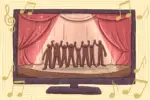A lot of students want to major in theater but aren’t sure that it’s the best route to take. They love acting, directing or designing costumes or sets, but are afraid that pursuing their passion as a major may not be worth their time in college, as being a theater student isn’t typically synonymous with being employable.
Students who may be on the fence about dedicating their collegiate career to the study of thespianism may choose to hedge their bets, often by minoring in theater or participating in drama clubs and productions; still, they do so knowing that they will always receive second-priority behind their peers who have committed to the major.
But, whether you are considering devoting your life to the stage or are just interested in participating in the occasional show, there are several reasons why theater is underrated when it comes to real-world applicability. I
n fact, studying the art of acting as an undergrad can help you learn valuable lessons that will help advance your career in any number of job fields, and many of these lessons are unavailable in more traditional paths of study. So, here are four ways that studying theater can help you in the professional world.
1. Collaboration/Teamwork
Theater majors embrace collaboration. All the elements of a production—lighting, set, costume, acting, directing and more—must complement each other during show time, a reality that theater majors appreciate more than most. Since no part of the show can go on without the others functioning properly, everyone works to avoid stepping on the toes of their peers, which leads the crew to value their coworkers more than most employees appreciate their peers.
In a similar vein, the collaborative nature of theater encourages to treat each other with professionalism. As in professional theater productions, unless they want a lecture from the director or a bad reputation, which can lead to an inability to find work in later productions, actors in college productions do not treat costume designers and other crew members as lesser beings. So, since everyone wants to hire a candidate that works well with others, as a result of their intensely collaborative backgrounds, theater majors have a major advantage in that department.
2. Communication
Communication is very important when it comes to theater productions. In order for the production to go smoothly, the light designer must communicate with the director, who communicates with the actors, and so on. If one person slips, then the whole show goes down.
Understanding one’s duties in order to execute them as expected, as well as being able to communicate what is needed of others, is essential for success. The same idea applies to the workforce, where producing positive end results requires employees to listen to each other in order to come up with solutions and completing projects.
Theater majors are effective communicators because they’re all about getting the job done. They ask questions about what they should do and how they should do it in order to get the most out of what they study so the skills can be applied in their post-graduation life.
3. Quick Thinkers
In almost any job, unexpected situations will most likely occur. While most people won’t know what to do in these spontaneous mishaps, theater majors, especially those who have studied improvisation, would know exactly what to do. Actors need to be able to think on their feet for the off-chance that a costume malfunction happens mid-act or before their scene. Some even hope for accidents to make their performance appear more realistic.
Directors are also known to work with understudies or actors who perform with a different set of actors on a different day to fill in for the actor who can’t make a rehearsal or performance. These are all ways theater students adapt to change in plans, which can be applied to almost any job.
Students of improvisation, more specifically, learn to apply a “yes and” approach to change. In other words, they learn to accept change, and work with it, rather than shy away from a possibility for a new occurrence. “Your first thought is your best thought” is the motto, which is used to motivate actors to think on their feet. Hiring managers many times appreciate candidates who can work in a fast-paced environment, and handle multiple tasks.
4. Time Management
One of the first lessons theater majors learn is to be on time for rehearsal, which really means being fifteen minutes early. With everything else going on in an actor’s life that is not part of production, such as schoolwork, down-time, and friends and family time, and not to mention time for themselves, friends and family, thespians need a way to balance everything.
Because they already have a mindset of being early and diving time between projects, this professionalism and consideration for time is a plus on the job; it shows commitment, reliability and responsibility to the work and company.
However, if you’re still worried about finding a job after majoring in theater, talk to a career counselor about your options. You may be able to find a job flexible enough to work around your dream theater career, or something totally different. Theater majors are known to go on to law school, teach, become scientists, and so on.
They may also study acting for theater but choose to work as a dramaturg, director or other theater personnel. So be open-minded; the only reason you need to study theater is an appreciation for it. Take part in theater productions, or complete an internship or two to learn more before becoming a theater major if it’s new to you.

















